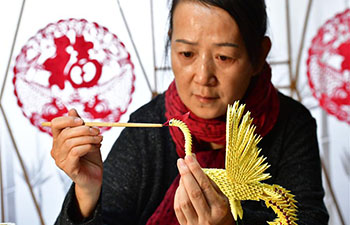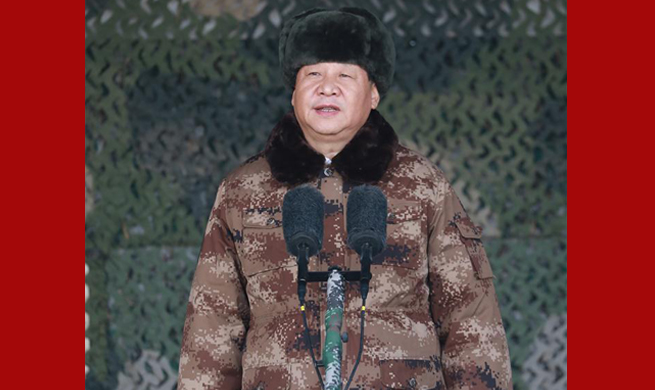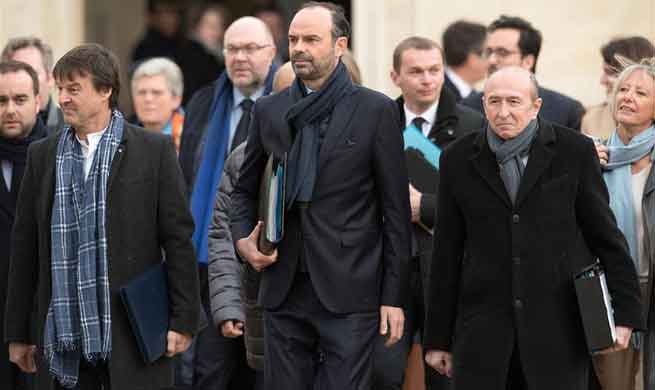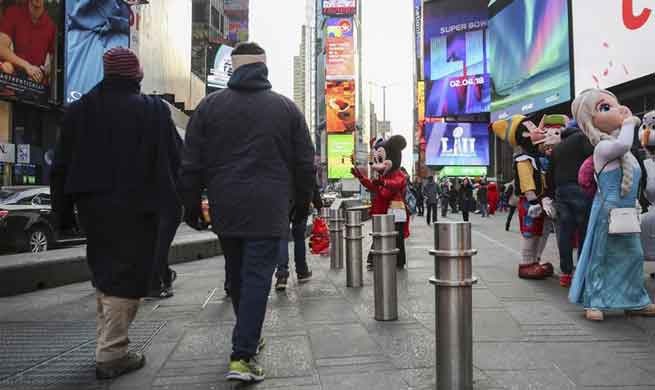LONDON, Jan.3 (Xinhua) -- Political pundits were Wednesday playing a guessing game as re-shuffle fever spread through Westminster with British Prime Minister Theresa May poised to make changes to reshuffle her team of ministers.
From major changes in her top team, including Brexit Secretary David Davis and Foreign Secretary Boris Johnson given new roles, to a more modest shake-up of junior ministerial ranks, speculation embraces every level at 10 Downing Street.
Dr. Andrew Crines, lecturer in British Politics at the University of Liverpool, warned it could give ammunition to critics of a government in crisis.
Meanwhile Professor Tony Travers from the London School of Economics' Department of Government told Xinhua that Brexit chief Davis and Chancellor of the Exchequer Philip Hammond appear to have the greatest risk of being moved or having their positions weakened.
"The Chancellor's autumn budget was well received, so his position is probably stronger than hitherto. David Davis is the one to watch," said Travers.
The political gossip mill has been working overtime during the festive year, guessing what surprises would be sprung early into 2018.
The Guardian claimed May is preparing a new year reshuffle that could see a number of cabinet figures losing their positions.
The Guardian claimed May is said to be considering offering Foreign Secretary Boris Johnson a move to a Brexit delivery role based in another department, but he is likely to resist such a move.
The Evening Standard in London, now edited by former Chancellor George Osborne, says May's Cabinet rejig, expected in the next couple of weeks, is an especially tough one to get right.
The government has been undergoing involuntary upheaval in recent months, losing Defense Secretary Michael Fallon and International Development Secretary Priti Patel, as well as May's de-facto deputy Damian Green, constraining May's options, says the Standard.
The Sun predicts that rather than a political earthquake, May is eyeing a "significant" reshuffle of the junior government ranks, while only making minor changes to her top team.
May, the paper says, is under pressure to bring in new talent to the government ranks to give future leadership contenders vital ministerial experience.
In the political publication The Spectator, commentator Isabel Hardman says: "Westminster wisdom has long been that it is dangerous to move your top team around, as sacked ministers make troublesome backbenchers. This does ignore the inconvenient truth that most of the trouble that May has faced over the past few months has come from within her Cabinet -- albeit with an extra helping of Brexit rebels on the Conservative backbenches too."
In an exclusive interview, Crines told Xinhua: "Whilst it is true that a reshuffle will inject life into the government, it will inevitably give critics short term ammunition to argue that it is unnecessary change and the sign of a government in crisis.
"This isn't helped by May losing three members of her government in less than ideal circumstances. She needs to get some distance from those departures and one way to do that is to reshuffle some of the junior ministers and maybe move a big name or two."
Crines said he believes it is possible some big names may be moved but are likely to remain within the government.
"This is because sacking ministers gives the appearance of difficulties. To send out the right message of leadership competence she can only replace any big names who choose to go on their own free will... Also bringing back any of the older big names would likely be a mistake as it sends the message that the Party lacks younger talent," he said.
Crines says a reshuffle at the start of the New Year tends to strengthen the party leader.
"This is because it appears fresh, new, and more likely to give the government a renewed sense of purpose. In May's case she needs to keep the Conservative Party happy. It is a question of balancing the ideological divisions, issues of competence, media profile, and social background. If she is able to put together a strong team then it will help solidify her position further. If, however she agitates the backbenchers and activists then it could make leading the party harder."
Crines said following the June election when May lost her overall majority, she was significantly weakened but not destroyed.
"Since June she has shown that her weakness doesn't mean she is at risk of a realistic challenge. Consequently she needs to keep the Party happy, and so by responding to demands she can solidify her position further. She is also safeguarded by the Fixed Term Parliament Act, which means a snap election called by a vote of no confidence is highly unlikely, as such there is little risk of a Corbyn government unless May herself calls for an election. This, therefore strengthens her position despite still being weakened by the 2017 election".
The LSE's Professor Travers said a reshuffle would probably see May benefiting from being seen to assert some authority over the government, which has been riven by splits and disagreements.
"Now may be a relatively good time to do so as there are few realistic opportunities for her opponents within the Conservative Party to react badly against any changes, for example, by rebelling on votes about the Brexit legislation," he told Xinhua.
Travers said assuming the reshuffle did not lead to a bad response among her own MPs, it should somewhat strengthen her position.
A fear of Labor leader Jeremy Corbyn becoming prime minister has a powerful impact on Conservatives, said Travers.
"It makes them very unwilling to trigger a general election. Pro-Brexit MPs want Mrs May to stay in office until the UK has left the EU. Once this has happened, everything changes."

















